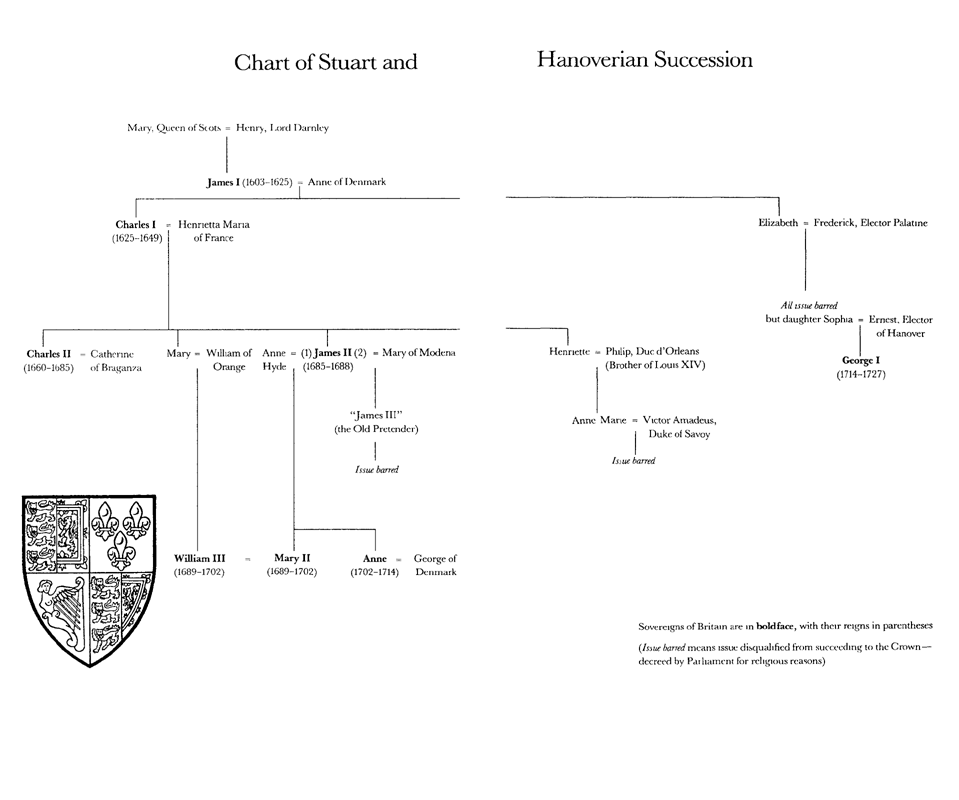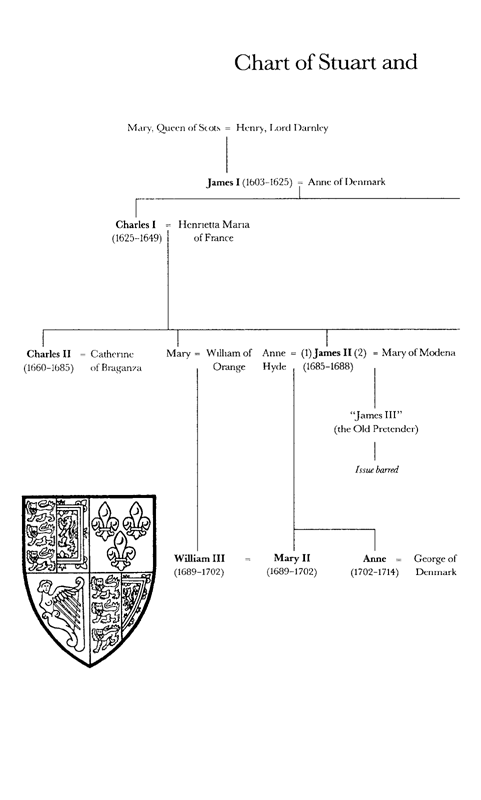Exit Lady Masham

Louis Auchincloss
Table of Contents
Chart of Stuart and Hanoverian Succession



HOUGHTON MIFFLIN COMPANY BOSTON
1983
Copyright © 1983 by Louis Auchincloss
All rights reserved. No part of this work may be reproduced
or transmitted in any form or by any means, electronic or
mechanical, including photocopying and recording, or by
any information storage or retrieval system, except as
may be expressly permitted by the 1976 Copyright Act or in
writing from the publisher. Requests for permission should be
addressed in writing to Houghton Mifflin Company, 2 Park
Street, Boston, Massachusetts 02108.
Library of Congress Cataloging in Publication Data
Auchincloss, Louis.
Exit Lady Masham.
1. Masham, Abigail, Lady, 1684 or 5â1734âFiction.
2. Anne, Queen of Great Britain, 1665â1714âFiction.
I. Title.
PS3501.U25E9 1983 813'.54 83-319
ISBN 0-395-34388-7
Printed in the United States of America
D
10 9 8 7 6 5 4 3 2 1
A signed first edition of
this book has been privately
printed by The Franklin Library.
PART ONETO BARBARA W. TUCHMAN,
who has made history more fascinating
than any fiction
1
Oates Manor
Buckinghamshire
November, 1733
I
t was Lord Hervey who persuaded me to embark on these memoirs. So strong an impression did he make on me that here I am, only a week after his suggestion, taking up my pen.
"Don't put it off, Lady Masham, I beg of you," he urged me. "You owe it to history. Those of us who were privileged to view the making of great events have the duty to record them. Some of the mightiest monarchs survive to posterity only in the pages of humble scribes. George II and Queen Caroline will have Hervey. Queen Anne will have Your Ladyship."
"You forget you're talking to an old woman. I may not have the time."
"I don't consider fifty-three old."
"So you've looked me up!"
"That is a penalty of fame."
"Fame! Admit, my friend, that your good Queen Caroline would not have asked me to come to court today had you not piqued her curiosity by telling her my story. Isn't that true? She had never heard of me, had she?"
"My dear lady, what does that prove? The Queen was raised in a petty German court and knows nothing but Teutonic history. Still, we must give her credit. She wants to learn, and she never forgets. Most German princesses are absolutely hopeless. She was recalling the other day what her mother had replied to our minister to Anspach when he suggested that her daughter should learn the tongue of the nation that her betrothed husband would one day rule. 'Ach, there's no sense to that! After the Hanover family have been on the throne another year or so, the English will all speak German.' It is true that it was I who first brought your name to Her Majesty's attention, but she listened with the greatest interest to your story. And, of course, every English schoolchild has heard of you."
"The way they've heard of the Battle of Hastings. As something ancient and remote from their daily lives. Oh, yes, I understood those glances in court today, Lord Hervey! 'Who is that? Lady Masham? You don't mean the friend of Queen Anne? Is
she
still alive?'"
"Well, I'd be the last man in the world to deny the shortness of a courtier's memory. But some people recall more than you suppose. And it wasn't
that
long ago, anyway. When did Queen Anne die? In 1714? Why, that's not a score of years back."
"It seems more to one who has hardly been away from Oates Manor in all that time. I feel like Hermione in
The Winter's Tale.
I am stepping down from my pedestal into a new world. And not one, I fear, that I like very much."
"All the more reason to keep the past alive."
"Well, the country mouse will think about it, Lord Hervey, when she's back in her quiet nest."
As this manuscript will not be published in my lifetimeâand certainly never, if my husband survives meâI should explain who Lord Hervey is. He is the court chamberlain whom Queen Caroline dotes on, quite as if he were her own son. Much more so, actually, for both she and King George are reputed to detest the Prince of Wales. It is generally believed that Sir Robert Walpole depends on Lord Hervey to keep the Queen in line politically when she is acting as regent during the frequent visits of her spouse to his beloved Hanover. But more important, at least to me, the chamberlain is supposed to be the most beautiful and charming man at court. They say he bewitches both sexes, that husbands forgive him for lying with their wives and even their mistresses. It is notorious that he is the father of Miss Vane's last child, whom the Prince of Wales is raising as his own bastard!
Out of the blue I received a letter from Lord Hervey three weeks ago, instructing me that Her Majesty desired to make my acquaintance and appointing the day on which I was summoned to St. James's Palace. I had become so accustomed to my quiet life in the country, with my back firmly turned on courts and palaces, that it required a considerable resolution to overcome my inertia and obey.
Everything at St. James's seemed much the same as in the old days, except for the presence of many more guards, a symptom, not of George II's fear of assassination, but of his passion for the military. Lord Hervey, who met my chair by the gate, was even more charming than I had anticipated. He escorted me to where Queen Caroline, with the Princesses Caroline and Emily, was receiving at a late afternoon drawing room. After I had made my curtsy I was invited to sit with the royal group. The Queen, a robust, straight-backed woman, who may have been pretty when she was young, addressed me in the gruff, direct German manner.
"I am most interested in the court of Queen Anne, Lady Masham. It seems to have been a women's paradise. All the favorites were ladies!" Here she laughed, rather crudely, and glanced at her daughters, as if to suggest that such an anomaly could have existed only in England. "Is it true that the Queen and the Duchess of Marlborough addressed each other as 'Mrs. Jones' and 'Mrs. Smith'?"
"Not quite, ma'am. Her late Majesty adopted the sobriquet of 'Mrs. Morley,' while the Duchess chose the surname 'Freeman.'"
"And did they call each other 'Mrs. Morley' and 'Mrs. Freeman' in public?"
"Oh, no, ma'am, never. That was only for their private use. They desired to ease the
gêne
that may exist between sovereign and subject."
"Really! I cannot imagine a German royalty permitting such a liberty. And yet I do not believe that any
gêne
exists between me and those whom I like and trust. Is it not so, Lord Hervey?" She turned to her chamberlain with what seemed as close to a wink as a Teutonic princess could emulate. "He tells me of his
amours,
the naughty boy! The late Queen and her beloved Duchess must have been like two old village gossips. And it was you, Lady Masham, who broke up that famous friendship? How did you do it?"
My disgust with the House of Hanover was so strong at this point that I was at a loss for words. Had the Pretender at that junction appeared in the doorway, I think I should have knelt to him, even at the risk of my head! But at last I managed to find my tongue and to murmur something about the rupture between myself and the Duchess having been of the latter's seeking.
"But what had she against you?" the Queen persisted. "That you had stolen Queen Anne's heart?"
Another coarse laugh, and another
oeillade
to the Princesses, showed me clearly enough how the Queen construed my relationship to Anne of England. I tried to keep my composure by reminding myself that it was not the first time that I had been subjected to such insinuations.
"I can only repeat, ma'am, that you must go to my cousin for your answer."
"Your cousin? The great Duchess is your cousin? I thought you had been only a bedchamber woman to the late Queen. I shall never understand your English families."
"They
are
confusing, ma'am. They keep going up and down. We cannot boast the stability of the continent."
Fortunately, the royal circle now opened to welcome the King's mistress, Lady Deloraine, and the old "favorite" of Queen Anne's days was quickly forgotten. It was on my way out of the palace, escorted by the still solicitous Lord Hervey, that the colloquy took place that I have recorded. At the end of it, when I was in my chair and about to be borne away, I did a strange thing. It is the kind of thing that any lonely, forgotten old woman may do when confronted with a man who is young and beautiful and kind to her. I seized his hand and imprinted my lips on it.
***
As I look about the world today, I begin to see what Lord Hervey meant. The group of persons who exercised political power in the last four years of Queen Anne's reign have disappeared so completely from the London scene that it is almost as if they had never existed. And look at the ones who have
not
disappeared. Look at the people who in 1711 were supposed to have been swept out of power by the "Tory clique," headed by Robert Harley and Henry St. John, and assisted by the wily Abigail Hill, that sly hussy who managed to turn herself into "Lady Masham." Those who were ostensibly defeated seem now to have embedded themselves in the golden fabric of English glory, while the Tory clique has been relegated to obscurity or disgrace. Who today has heard of Abigail? What is St. John but a pardoned traitor? Or Harley but a drunken and now dead politician? Yet old Sarah, the widowed Duchess of Marlborough, is holding court at Blenheim Palace as splendidly as any queen. She has become the very symbol of our late victories abroad, and her deceased warrior-husband is our national hero and legend. The days of the Marlborough ascendancy in the reign of Queen Anne are deemed by many the finest pages in our history.
I suppose I should have expected all this. My illustrious friend the great Dean Swift used to say that history is made by those who have a "strong style." Nobody, he would argue, cares about "facts." The great Queen Elizabeth was actually a puppet in the hands of William Cecil, but as she was composed of brilliant colors and he of dull grays, she usurps his rightful place in all the chronicles. Suetonius's Livia, in like fashion, has blinded us to a hundred dreary senators and generals, and, nearer to our own day, Louis XIV has emitted gorgeous rays to distract the attention of posterity from the grubbing ministers behind his gilded throne.